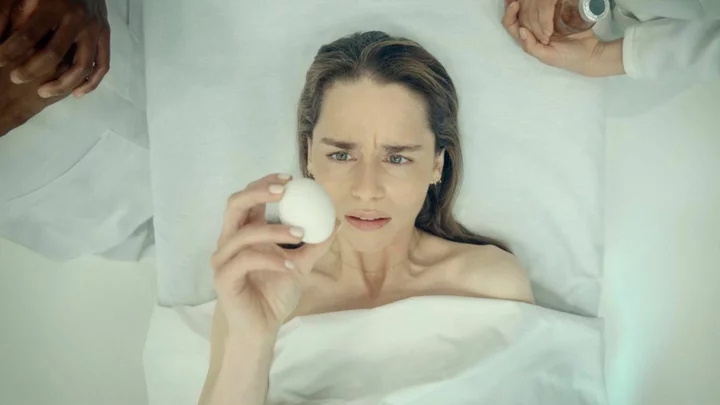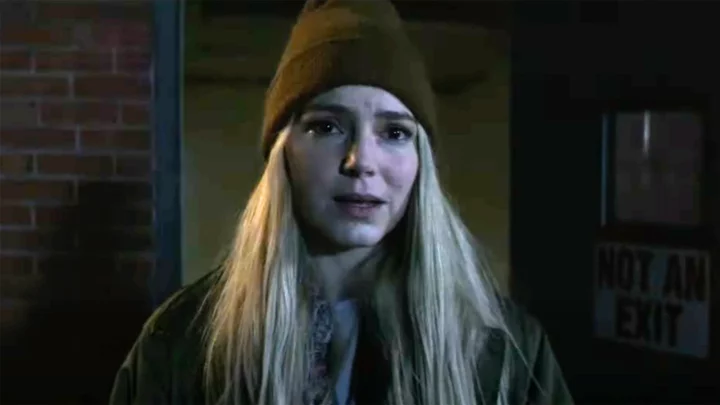Modern women are damned by the promise of "having it all." (Just ask Barbie.) This lofty concept suggests that if we can just figure out the work-life balance, we can succeed in our careers, build a thriving family, and find the time for self-care and self-love. It's totally possible, so why do you suck at it?
"Having it all" is a promise made by a capitalist society determined to sell us anything from toiletries to technology in the pursuit of happiness. The Pod Generation explores the absurdity of this all-too-common concept, setting its science-fiction comedy in a not-so-distant future where AI assistants manage our domestic duties, apps track our diets, and pregnancy can be outsourced to an artificial womb that looks like a Steve Jobs wet dream.
Rich terrain for sci-fi dystopia like Black Mirror might be mined in this concept. However, The Pod Generation comes from writer/director Sophie Barthes, who broke through in 2009 with Cold Souls, in which Paul Giamatti plays himself in a sci-fi thriller where he exports his soul to escape the weight of it. In her hands, a story of a couple having a pod baby becomes a clever and poignant comedy about the quirks of technology, privilege, and the inhumanity of having it all.
SEE ALSO: Is going to a movie during the WGA/SAG-AFTRA strike crossing the picket line?What's The Pod Generation about?
Credit: VerticalEmilia Clarke and Chiwetel Ejiofor are utterly charming as Rachel and Alvy Novy, a middle-aged metropolitan couple who have achieved an array of status symbols: a gorgeous spouse, a large apartment decorated in a poshly minimalist style, a vacation home upstate, and jobs of power and prestige. But there are sharp contrasts between the two.
Rachel is an eternally poised executive who wears pressed gray suits and works at a standing desk with a treadmill so she can be as productive as possible. Alvy's a rumpled botany professor with a beard and a closet full of T-shirts. Where she works in a high rise full of other execs from her same prim mold, he's an eccentric begging his students to literally hug trees and appreciate the non-hologram plant life that manages to survive in this ludicrously artificial age of oxygen bars and 3D-printed toast.
So when it comes to having a baby, Alvy'd prefer the natural way: intercourse leading to Rachel physically carrying a child in her womb. But hey, what modern mom has time for that? Under intense pressure from her peers, Rachel pursues a pod pregnancy; using in vitro fertilization, the fetus gestates in a large, plastic egg that serves as an artificial womb while they go on living their lives uninterrupted until their due date. However, the path to parenthood proves trickier and trippier than either could imagine.
Sophie Barthes's The Pod Generation gives us a future that's funny and unnervingly familiar.
Credit: VerticalBarthes lays out a Black Mirror scenario where at first it's easy to be enchanted by the AI and virtual outsourcing of tedious human tasks, like making breakfast or picking out an outfit. A color palette of creamy pastels makes much of the film feel like walking into a society founded on an ethos of "Live, Laugh, Love." Everything is soft but sterile, uncomplicated by individuality or the messiness of humanity or nature.
Rachel begins at ease with all of this, smiling placidly at the office and earnestly sharing her thoughts with her therapist, who is also AI and looks like an enormous eye surrounded by flowers. Rachel's conversations with friends echo any number of common brunch talks, except now the phrases of self-empowerment are employed to justify "detachment parenting," where the parents contribute their genetic material and then can essentially treat their fetus like a Tamagotchi, feeding it via an app and creating a playlist for it to hear in virtual utero. Except a Tamagotchi will die if left untended, and really, the Womb Center doesn't need the parents involved at all. But it is an option.
SEE ALSO: Everything you need to know about 'Black Mirror' Season 6Despite the admittedly tempting ease of this technology, Alvy is not convinced by the modern obsession with the artificial as superior. He loves to have his fingers in real dirt and pleads passionately for the beauty and splendor to be found in nature. And yet, once his future child is in a pod, its plastic casing cannot break his connection to it.
There's a sweet silliness to watching both parents struggle to strap the egg on to wear BabyBjörn-style, fumbling in their new physicality. More cutting comedy comes from how the wider world reacts to their out-of-fashion doting. Mothers mock the fathers who are enthusiastic to share in some semblance of carrying a pregnancy, and a female co-worker scolds Rachel for bringing the pod to work: "You don't want to be labeled as the distracted mom."
A cutting critique of capitalism co-opting the language of feminism and self-care is explored through these conversations, as well as through the representatives of the Womb Center. The face of the Womb Center is — of course — a wealthy white man with an unwavering smile who speaks with unearned confidence about the glory of maternity. His less cuddly counterpart is the Womb Center Director (a mesmerizing Rosalie Craig), who speaks in a tone that is sharply friendly yet undeniably intimidating, maybe even vaguely threatening. Together, they make the "options" offered feel more like a cult command, pushing the audience and these soon-to-be parents to crave escape.
At its core, The Pod Generation is about love.
Credit: VerticalBeyond the plants and parenthood, The Pod Generation rages slyly against conformity. The idea that there is one best way to do anything clearly rankles Barthes, who challenges her characters to go outside their comfort zones to find what they love, and what they'd do to fight for that.
To better explore the desires of a heroine who has been socialized to be pleasant and conforming, Barthes allows us into Rachel's dreams. There, the pastel aesthetic still has a grip on her, but her vision of herself is of someone capable of softness and transformation, and comfortable in that pursuit. This surreal thread interweaves with Alvy's surprise pleasure in fostering their pod. And then the third act rebels. Some reviews out of the film's Sundance debut complained it sets up a sci-fi world that its climax doesn't pay off. However, this too is crucial to Barthes's plea for the value of individuality.
Despite its broad title, The Pod Generation is not about the wide world or a whole generation. It's about one single family and how they decide to become one. Within that tale, Barthes delivers a comedy that is clever, enchanting, thrillingly unique, and unapologetically tender. It also might make you second-guess tech billionaires who promise you everything in an app, and to be a bit more dubious of anyone or anything selling you contentment at the click of a button.









